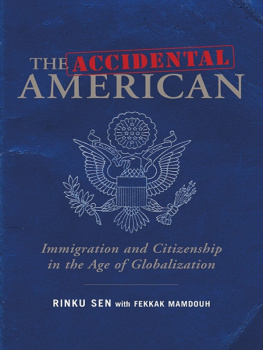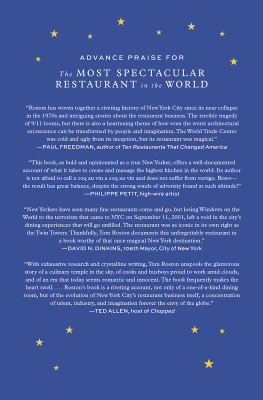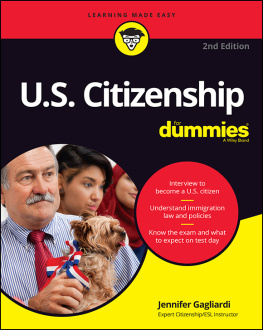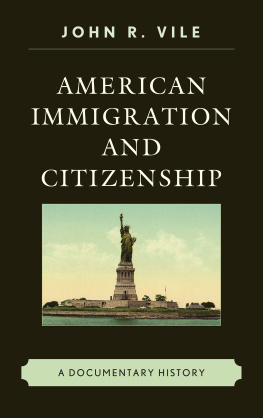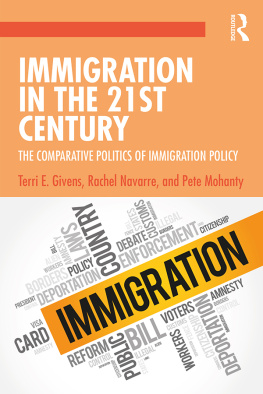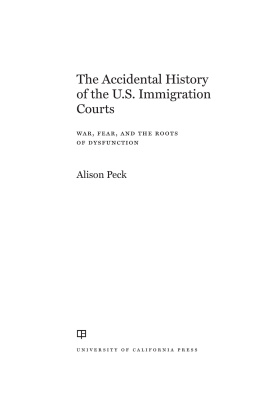THE ACCIDENTAL AMERICAN
The Accidental American
Copyright 2008 by Rinku Sen and Fekkak Mamdouh
All rights reserved. No part of this publication may be reproduced, distributed, or transmitted in any form or by any means, including photocopying, recording, or other electronic or mechanical methods, without the prior written permission of the publisher, except in the case of brief quotations embodied in critical reviews and certain other noncommercial uses permitted by copyright law. For permission requests, write to the publisher, addressed Attention: Permissions Coordinator, at the address below.
Berrett-Koehler Publishers, Inc.
235 Montgomery Street, Suite 650
San Francisco, California 94104-2916
Tel: (415) 288-0260, Fax: (415) 362-2512
www.bkconnection.com
Ordering information for print editions
Quantity sales. Special discounts are available on quantity purchases by corporations, associations, and others. For details, contact the Special Sales Department at the Berrett-Koehler address above.
Individual sales. Berrett-Koehler publications are available through most bookstores. They can also be ordered directly from Berrett-Koehler: Tel: (800) 929-2929; Fax: (802) 864-7626; www.bkconnection.com
Orders for college textbook/course adoption use. Please contact Berrett-Koehler:
Tel: (800) 929-2929; Fax: (802) 864-7626.
Orders by U.S. trade bookstores and wholesalers. Please contact Ingram Publisher Services, Tel: (800) 509-4887; Fax: (800) 838-1149; E-mail: customer.service@ingram publisherservices.com; or visit www.ingrampublisherservices.com/Ordering for details about electronic ordering.
Berrett-Koehler and the BK logo are registered trademarks of Berrett-Koehler Publishers, Inc.
First Edition
Hardcover print edition ISBN 978-1-57675-438-2
PDF e-book ISBN 978-1-57675-892-2
IDPF ISBN: 978-1-60994-308-0
2008-1
Project management, design, and composition by Steven Hiatt / Hiatt & Dragon, San Francisco. Copyediting: Steven Hiatt Proofreading: Tom Hassett.
Dedicated to the memories of
Bouchaib Mamdouh and Arun Kumar Sen,
and to migrant workers everywhere
Introduction
COMING TO CITIZENSHIP IN A NEAR-GLOBAL AGE
At 8 a.m. on September 11, forty-year-old Fekkak Mamdouh was asleep, having worked the previous nights late shift from 4 p.m. to 12 a.m. His wife, Fatima, lay beside him; she had dropped off their daughter at kindergarten four blocks away and then climbed back into bed. For six years, Mamdouh, whom everyone knew by his surname, had been a waiter at Windows on the World, the luxury restaurant on the 107th floor of the World Trade Centers North Tower. He had started working there in 1996 when Windows reopened after the 1993 terrorist bombing in the buildings basement. Mamdouhs wide brown eyes and the round apples of his cheeks gave him a disarming look of innocence. These mellow features hid the scrappiness that had made him a beloved, though sometimes controversial, union leader.
The first call came from Mamdouhs sister Saida, who lived in Italy. She told him to turn on the TV. The second call was from his brother Hassan, who lived down the street. Listen, brother, there was a plane that just crashed through the Twin Towers, Hassan said. Guess what? Youre not going to have a job for a couple of months while they fix the place.
Mamdouh and Fatima turned on the TV thinking of terrible accidents when the third call cametheir neighbor telling Fatima to get their girl out of school. Fatima hurried to retrieve her daughter Iman. When she got back, Mamdouh was still transfixed by what was flashing across the television screen. He said, You watch. Theyre going to say its Muslims.
Fatima asked him why he thought so.
Because they did it in ninety-three, he said, referring to the earlier attack.
Without eating, Mamdouh left their house in Astoria, Queens. He went to 8th Avenue and 44th Street, the offices of his union, Local 100 of the Hotel Employees and Restaurant Employees (HERE). He and other union members made two lists: one of all the workers who would have been catering breakfast for Risk Management employees that morning, and another of all the places they might be found. Then teams of shop stewards and union organizers set off to search for the workers and track their families. Mamdouh paired up with a colleague, an Egyptian immigrant and now former captain at Windows. The two started out at hospitals, asking who had been brought in. They met many families of people who had worked at the World Trade Center, but they found no actual casualties of the attacks. They made their way down Manhattans West Side, where all its hospitals are located. After the fourth one, Mamdouhs companion, who had been crying steadily, said he couldnt take any more. He went home, while Mamdouh headed to the morgue on First Avenue and 30th Street, staying there until 3 a.m.
The following night, Mamdouh gave an interview to a cable news channel. One of his friends, another Moroccan, saw the interview and called him the next day to ask why he hadnt said that Muslimsmeaning regular, real Muslims like themhadnt done this thing. Mamdouh told him that people already knew.
For the next five days Mamdouh ate and slept very little. He spent hour after hour circling the morgues lobby carrying a sign: If you know anyone who worked at Windows or if you worked at Windows, please call the union. Mamdouh was able to cross barback Mario Peas name off the missing list on September 12, and he found cashier Faheema Nasar a full week later, but in the end, seventy-three of his co-workers werent coming back.
A couple of days after the attack, Mamdouh and Fatima went to their neighborhood Pathmark store. She had covered her head in hijab, as she had since her mother died three years before. It was evening and the store was not at all crowded. They were the only people wanting to buy fish, and Mamdouh stood at the counter with her while she tried for several minutes to get the fishmongers attention. Eventually, Mamdouhs patience gave out.
Hey, shes trying to talk to you, he said to the clerk, who continued to ignore them. Shes trying to ask you a question.
Dont you know what you guys did? was the response.
What?
The World Trade Center. It was a mumble, but Mamdouh heard it clearly enough.
He snapped. His eyes widened, his smallish frame puffed up.
What are you talking about, what we did? I lost seventy-three of my friends there. Maybe you didnt lose anybody, and you dont know what youre talking about. The clerk backed up from the counter while Mamdouh yelled, I want to see the manager! He yelled some more at the manager, who apologized. Neither Mamdouh nor Fatima would ever return to that store.
Something shifted in Mamdouh that day. The clerks accusation had wounded him. Two days after the tragedy, he was ever aware that he himself could easily have died. He suffered for the loss of his colleagues, and the idea that someone would associate him with their deaths because he was Muslim was shocking. Until then, he had been living the life of a lucky immigrant, getting great jobs in high-end restaurants because he spoke fluent French. He had come to the United States to make money and to be near his younger brother, and although he missed Morocco, he had felt American enough to marry here and have two children who were born U.S. citizens. Despite his prediction to Fatima that Muslims would be blamed for 9/11, he had actually managed to get by for twelve years without noticing American discrimination in a daily way, not toward black people or Asians, and certainly not toward himself. Now he rewound his history, noticing things that he hadnt clearly seen before. He couldnt yet know, however, that these new insights would reshape his life as an immigrant worker in America.

